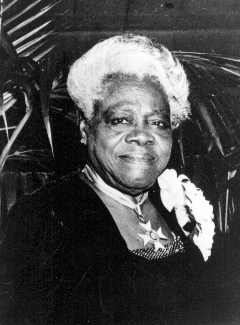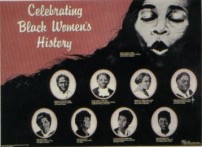|
|
||
Black
History Month all year long...
part
of an on-going section on African-American women, and women and race |
|
|
|
|
 |
Voices From the Gaps offers a growing archive on the work of women writers. A valuable resource, that invites additions. From their own introduction: "Voices from the Gaps is a World Wide Web project that focuses on the lives and works of women writers of color in North America. The Voices project is made possible through an ongoing collaborative effort between faculty and students in the Department of English and the Program in American Studies at the University of Minnesota. In addition, this site relies upon students and scholars from around the world to contribute "author pages" for women writers of color." |
African
American Women Writers of the 19th Century
is a digital collection of some 52 published works by 19th-century black
women writers. A part of the Digital Schomburg, this collection provides
access to the thought, perspectives and creative abilities of black women
as captured in books and pamphlets published prior to 1920. A full text
database of these 19th and early 20th- century titles, this digital library
is key-word-searchable. Each individual title as well as the entire database
can be searched to determine what these women had to say about "family",
"religion", "slavery" or any other subject of interest to the researcher
or casual reader. The Schomburg Center is pleased to make this historic
resource available to the public.
African-American
Women On-line Archival Collections Special Collections Library,
Duke University
AFRICAN
AMERICAN WOMEN Selected Primary Sources in the Sophia
Smith Collection and College Archives
"Black Women Oral History Project [Schlesinger Library] (1976-1985).
Transcripts of oral histories of 66 black women, most born before l9l0,
who "have made strong impacts on their communities through their professions
or through voluntary service."
The Minorities Collection includes printed materials relating to the status
women of color in the United States, dating from 1915 to 1983. Items of
interest include unpublished position papers from the Wesleyan College
Center for Research on Women; and reports from the Conference on the Educational
and Occupational Needs of Black, Hispanic, Asian-Pacific American, American
Indian, and White Ethnic Women (1976-78). View finding aid The Slavery/Anti-Slavery
Collection primarily documents the efforts of American abolitionists from
1791 to 1865. Items include sale deeds of female slaves (1820 and 1858),
photographs of emancipated slaves, early articles on African American
history, and writings on the escaped slave William Wells Brown by W. Edward
Farrison."
(This collection also includes the papers of many 'white' women who were
anti-slavery activists.)
 |
The work of some women activists is fortunately well-documented. Among those whose lives we can appreciate are: MARY
McLEOD BETHUNE (1875-1955) Educator, founder of Bethune-Cookman
College and the National Council of Negro Women, the first Black
woman to receive a major U.S. government appointment and was the
mentor and mother figure for generations of Black male and female
leaders. "For I
am my mother's daughter, and the drums of Africa still beat in my
heart. They will not let me rest while there is a single Negro boy
or girl without a chance to prove his worth." |
 http://www.nps.gov/mamc/bethune/archives/photos.htm |
Mission
Statement of the National
Archives for Black Women's History: To identify, collect, develop, interpret, and preserve the legacy of Mary McLeod Bethune including her unique focus on the individual and collective history of African American women. Goals: To promote knowledge and understanding of Mary McLeod Bethune and African American women. To assist in the interpretation of the Mary McLeod Bethune Council House National Historic Site. To serve as a clearinghouse of information on African American women's history resources. To provide facilities for the research use of its collections. Collection Policy: The National Archives for Black Women's History documents the legacy of Mary McLeod Bethune. The archives collects materials about and illustrating Mary McLeod Bethune, the National Council of Negro Women, and other African American women's organizations. The archives also documents the ongoing preservation and interpretation of the Bethune legacy. The archives collects information in all media with a special focus on the years of Mary McLeod Bethune's life, 1875-1955. 1318 Vermont Avenue NW Washington, DC 20005 (202) 673-2402 |
|
On Black Feminism, a selection: National
Black Feminist Organization Collection Dates: 1974/1975
Abstract: The National Black Feminist Organization Collection includes
minutes, correspondence, memoranda, by-laws, published material,
and clippings related to the work of the Chicago chapter plus some
additional materials from the National Office. |
| AFRICAN-AMERICAN
WOMEN'S IDENTITY: A BIBLIOGRAPHY An on-line listing compiled by Xenturah Monique Woodley and Dr. Carmen Williams: "The majority of the items included in the bibliography deal with either gender identity or racial identity, very few dealt with gender and race as they related to Black women specifically. However, we feel that it is necessary to include all of these articles/chapters in our writing and research. This bibliography is not offered as the SOLE bibliography on Black women's identity, instead is being offered as a starting point for researchers interested in issues relative to African-American female identity..." |

